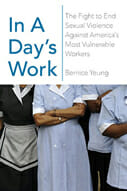Farmhands and Maids Say #MeToo
A powerful new book shines light on the rampant sexual violence against the nation's agricultural and domestic workers, who are excluded from laws meant to shield workers from abuse. The New Press
The New Press

Purchase in the Truthdig Bazaar
“In a Day’s Work: The Fight to End Sexual Violence Against America’s Most Vulnerable Workers”
A book by Bernice Yeung
More than seven months since #MeToo was reignited, we’re still hearing an outpouring of stories from survivors of sexual harassment and rape—experiences that may or may not count as such according to technicalities of the law. How these stories are perceived and responded to—or not—reveals the long shadows cast by biases built into the legal system. Bernice Yeung’s new book, “In a Day’s Work: The Fight to End Sexual Violence Against America’s Most Vulnerable Workers,” shines a light into these shadows to expose generations of sexual abuse suffered disproportionately by low-income immigrant women and the efforts to stop it.
The book updates and expands two major reporting projects. In 2013, Yeung, an investigative journalist for Reveal at the Center for Investigative Reporting, was part of a team that produced the award-winning report “Rape in the Fields,” which exposed rampant sexual assault of agricultural workers. In another exposé, “Rape on the Night Shift” (2015), Yeung and her team revealed that women cleaning empty buildings in the middle of the night were assaulted with little or no recourse.
Click here to read long excerpts from “In a Day’s Work” at Google Books.
For “In a Day’s Work,” Yeung widens her focus to include domestic workers who perform “the intimate and invisible work that happens in someone else’s bedroom, bathroom, and kitchen.” Domestic laborers typically share the same risk factors as women in the agricultural and janitorial industries, but they are even more vulnerable because in many cases they have been excluded from federal labor laws and often live with their abusers.
Yeung’s reporting achieves a balance rare in public interest journalism: She tells compelling stories that illustrate systemic problems without reducing people to mere players in a legal argument. She skillfully knits case studies into rigorous policy analysis. Most important, Yeung traces paths toward progress beyond merely raising awareness. For example, she highlights promising evidence-based efforts while acknowledging “the cottage industry” of ineffective workplace compliance training. She brings us to a training for workers at Pacific Tomato Growers in Florida focused on addressing domestic and sexual violence. The program was unique, Yeung writes, because instead of simply translating boilerplate materials, it was designed by farmworkers for farmworkers in their native tongue, using examples of sexual harassment fieldworkers can recognize. Yeung also describes the Fair Food Program, an effort that leverages consumer power by rewarding retailers that purchase produce from farms focused on preventing sexual harassment as part of workplace safety.
She also illustrates the high stakes her sources must consider before speaking about abuse. For example, the book begins with the story of a woman called Rosa, who has filed a sexual harassment lawsuit. A farm supervisor also raped Rosa’s sister while pressing gardening shears to her throat. He threatened to fire her sister and brother, and to have the children she works to support back in Mexico killed if she fought back or told. Rosa hesitantly talked to the reporters, then stopped, explaining her decision by showing the reporters photos of her children.
“This case exemplified the phenomenon our reporting team was seeking to uncover,” Yeung writes. “How immigration status and poverty are leveraged against female workers to hold them hostage in jobs where they are being sexually abused. Because there is no assurance that speaking out will be met with protection from future or collateral harm, the only rational thing to do is say nothing. After meeting Rosa, I came to understand why so many sexually abused workers have for so long abided in silence.” Yeung’s book nonetheless helps break that silence.
We learn a lot from the women able to speak to Yeung. Georgina Hernández is an undocumented hotel cleaner who couldn’t read or write when her supervisor started trapping her in private spaces, where he would assault her, then threaten to hurt her and her daughter and have her deported if she dodged him or retaliated. “There’s no way to defend yourself,” Hernández said. “There’s no way to say no. When you need the job, you become the victim of others. … You deal with it because you need the job.” Hernández was eventually able to escape the abuse and file a successful lawsuit thanks to the help of the Maintenance Cooperation Trust Fund, a California-based watchdog group devoted to workers rights in the janitorial industry.
Yeung writes of “a discordant reality” of domestic workers who, “in search of the American dream,” take on “one in only a handful of jobs in the United States that has been excluded from laws meant to shield workers from abuse.” As Yeung explains, agricultural and domestic laborers were excluded from federal protections as a way to avoid protecting black workers by proxy. Domestic labor was further devalued and degraded because black women disproportionately held those jobs.
Though it was begun well before the latest wave of the Me Too movement, “In a Day’s Work” nonetheless lands at a perfect time to inform the conversation. In November, Alianza Nacional de Campesinas, the national farmworker women’s alliance, wrote an open letter expressing solidarity with Hollywood actresses who spoke out about sexual abuse and harassment. “We wish that we could say we’re shocked to learn that this is such a pervasive problem in your industry,” they wrote. “Sadly, we’re not surprised because it’s a reality we know far too well.” A group of women working in film, television and theater responded with a letter announcing the launch of the Time’s Up Legal Defense Fund to help defray legal costs for women seeking help. Given that white women with privilege have all too often marginalized women of color in movements toward liberation, the letter was an astounding gesture.
So what’s next? The question is often asked as if #MeToo is some kind of runaway train. “In a Day’s Work” shows that in fact we are in control of what happens next: With vigorous reporting, we can parlay the momentum of #MeToo into real systemic change. To do that, it is urgently necessary to support the efforts of America’s most vulnerable workers, who are already leading the way, for the collective good.
Tara Murtha is a freelance writer, the author of the book “Ode to Billie Joe” and the director of communications at the Women’s Law Project, a nonprofit legal organization based in Pennsylvania.
©2018 Washington Post Book World
Your support matters…Independent journalism is under threat and overshadowed by heavily funded mainstream media.
You can help level the playing field. Become a member.
Your tax-deductible contribution keeps us digging beneath the headlines to give you thought-provoking, investigative reporting and analysis that unearths what's really happening- without compromise.
Give today to support our courageous, independent journalists.






You need to be a supporter to comment.
There are currently no responses to this article.
Be the first to respond.